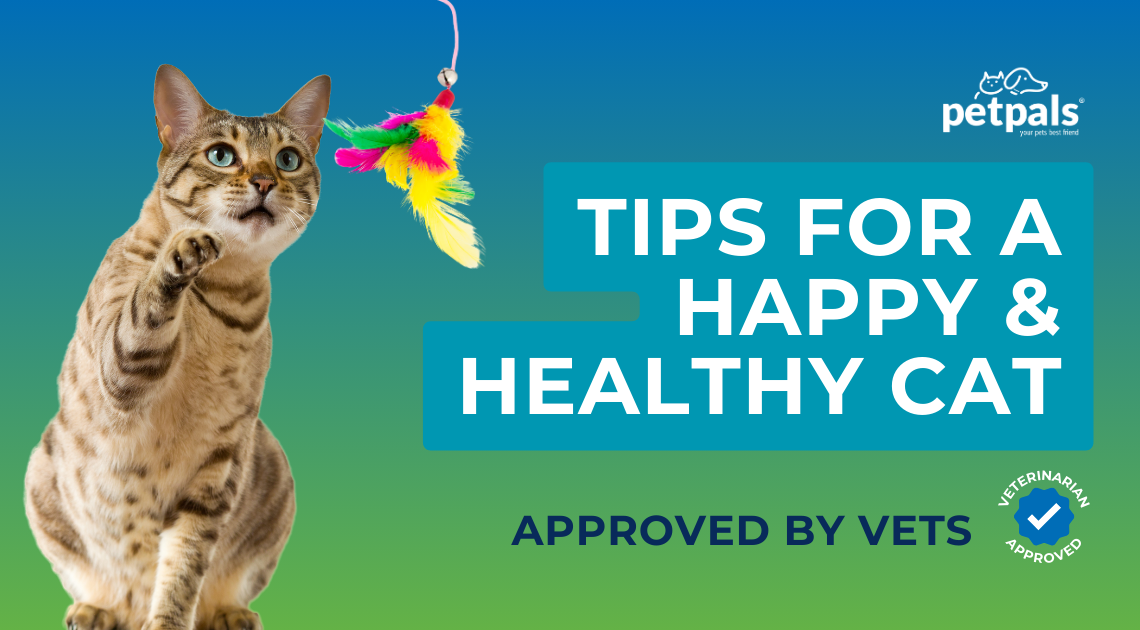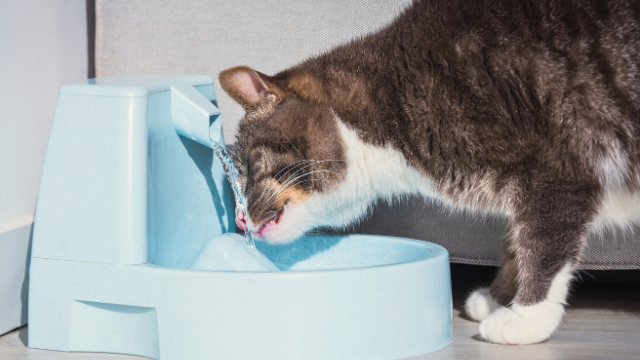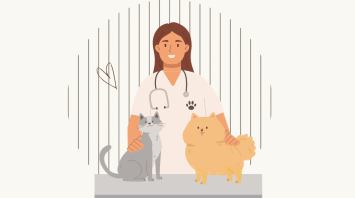10 Tips for a Happy & Healthy Cat!
16th September 2024


Did you know that September is Happy Cat Month? To celebrate, we want to share some top tips and expert advice from our in-house vet to help cat owners keep their furry friends both healthy and happy.
At Petpals, we know that cats are more than just pets – they’re cherished family members who bring joy and companionship to our lives. As responsible cat owners, it’s essential to ensure your feline friend is in great shape, both physically and emotionally. Keep reading for our expert tips and advice to ensure your cat stays purrrfectly happy and healthy.
1. Provide a Balanced Diet

Just like humans, cats need a balanced diet to stay healthy. Feeding your cat high-quality cat food that is rich in protein and low in carbohydrates is essential. Here’s what you should keep in mind:
– Choose high-quality cat food: Look for cat food that lists meat as the first ingredient. “Those rich in antioxidants can reduce signs of dementia in their later years,” explains Vet Sophie Bell. Avoid fillers like corn, wheat, and soy.
– Wet vs. dry food: Wet food can help keep your cat hydrated and prevent urinary tract issues, while dry food is good for dental health. A mix of both can provide balanced nutrition.
– Avoid human food: Certain foods like chocolate, onions, garlic, and grapes can be toxic to cats. Stick to cat-safe treats and foods.
2. Keep Your Cat Hydrated

“Cats are notorious for not drinking enough water, which can lead to kidney problems and urinary tract infections,” says Vet Sophie Bell.
– Provide fresh water daily: Change your cat’s water at least once a day to keep it fresh.
– Invest in a cat water fountain: Many cats are attracted to running water. A cat water fountain can encourage them to drink more.
– Wet food: Incorporating wet food into your cat’s diet can help with hydration, as it contains more moisture than dry food.
– Use raised food and water bowls: “Elderly cats are often arthritic, it is estimated 90% of cats over the age of 12 have arthritic changes and pain, raising their water and food bowls to elbow height would help them immensely,” advises Vet Sophie Bell.
3. Regular Veterinary Check-Ups

Routine vet visits are crucial for maintaining your cat’s health. Here’s why they’re important:
– Vaccinations: Ensure your cat is up to date on all necessary vaccinations to protect against common diseases.
– Microchipping: By law, all pet cats in England must be microchipped before they reach the age of 20 weeks. Speak to your vet or find a pet care professional near you that offers cat microchipping. Remember to keep your details up to date within the registered database.
– Preventative care: Regular check-ups help catch any potential health issues early on. Your vet can also provide flea, tick, and worm prevention.
– Dental health: Dental problems can lead to more serious health issues. Regular vet visits can help monitor and maintain your cat’s dental health.
4. Keep Them Active

Cats are natural hunters and need regular physical activity to stay fit and mentally stimulated. Here are some ways to keep your cat active:
– Interactive play: Use toys like laser pointers, feather wands, and balls to engage your cat in active play.
– Scratching posts and cat trees: These not only provide exercise but also satisfy your cat’s natural instinct to scratch and climb.
– Puzzle feeders and toys: Puzzle feeders can stimulate your cat’s mind while also providing physical exercise.
5. Make Arrangements When You Are Away From Home

Cats may seem independent, but they still need love and attention from their human companions, especially when you are away at work or on holiday.
– Plan for their care whilst you’re away: “Many cats prefer a home from home service with someone coming to them for their care. It can reduce anxiety and keep them within their familiar surroundings, especially if they have health conditions,” says Vet Sophie Bell.
– Choose a professional cat sitter: Choosing the right cat sitter for you and your feline friend is crucial. Ensure you check their credentials. Are they DBS checked, insured and trained in feline first aid, with a good understanding of cat behaviour? Be sure to do your research.
6. Create a Safe and Stimulating Environment

Cats are curious creatures that love to explore their surroundings. Providing a safe and stimulating environment is key to their happiness:
– Cat-proof your home: Ensure your home is free of hazards such as toxic plants, small objects that can be swallowed, and open windows.
– Provide perches and hiding spots: Cats love to climb and observe their surroundings from high places. Install cat shelves or provide cat trees. Also, offer cosy hiding spots for when they want to retreat and feel secure.
– Enrichment activities: Rotate toys regularly and introduce new activities to keep your cat mentally stimulated.
7. Regular Grooming

Regular grooming is essential, even for self-sufficient cats. Here’s what to focus on:
– Brushing: Regular brushing helps remove loose fur and reduces the risk of hairballs. It also keeps your cat’s coat shiny and healthy.
– Nail Trimming: For young and active cats, regular nail trimming may not be necessary if they have plenty of opportunities to scratch. Scratching helps naturally wear down the tips of their nails. However, if your cat is less active, you might need to trim their nails. Use proper cat nail clippers and gently press on their paws to extend the claws. Trim only the tip of the nail, avoiding the pink part, or ‘quick,’ which is sensitive and can cause pain if cut. If you’re unsure about trimming your cat’s nails yourself, it’s best to consult a professional groomer or veterinarian.
– Ear and eye care: Check your cat’s ears and eyes regularly for any signs of infection or irritation. Clean them gently if necessary.
8. Maintain a Clean Litter Box

A clean litter box is crucial for your cat’s health and happiness:
– Scoop daily: Remove waste from the litter box at least once a day.
– Change litter regularly: Replace the litter completely and clean the box every 1-2 weeks, depending on the type of litter used.
– Provide multiple boxes: If you have more than one cat, provide multiple litter boxes to prevent territorial disputes and ensure everyone has access when needed.
9. Monitor Your Cat’s Behaviour and Health

Cats are good at hiding discomfort and illness. It’s important to monitor their behaviour and health closely:
– Observe eating and drinking habits: Changes in appetite or water consumption can indicate health problems.
– Monitor litter box usage: An increase or decrease in urination or defecation can be a sign of health issues.
– Watch for behavioural changes: Lethargy, aggression, excessive grooming, or hiding can all be signs that your cat is not feeling well.
10. Knowledge Is Power!

“Finally, one of the best things you can do to ensure a healthy and happy cat is to educate yourself on signs and symptoms of ailments in cats. Cats are experts at hiding their discomfort, so learning about their behaviour, health requirements and feline first aid gives you the tools required to respond effectively in many situations,”says Vet Sophie Bell.
– Prevention is key: Spotting signs of discomfort in cats early and knowing how to respond can help reduce the need for vet interventions.
– Feline First Aid: Knowing how to perform crucial and sometimes life-saving feline first aid can be invaluable in emergency situations, helping to stabilise your cat’s condition and provide immediate care until professional veterinary assistance is available.
– Take a Feline health, well-being & First Aid course online. There are several providers of these courses, however Petpals highly recommend Dr Sophie Bells CPD approved, fun and interactive courses which are designed for pet professionals and pet owners alike!
Conclusion
Keeping your cat healthy and happy involves a combination of good nutrition, health and well-being knowledge, physical and mental stimulation, and lots of love. By following these tips, you’ll ensure your feline friend lives a long, healthy, and joyful life. Remember, a happy cat makes for a happy home!

Meet our in-house vet, Sophie Bell.
This article has been checked by veterinarian Dr Sophie Bell BVMS MRCVS. Sophie has worked as a veterinary surgeon for over 15 years and has a genuine passion for animals and their welfare. In addition to her work as a veterinarian, she owns and operates Animal Love Pet First Aid, a business that offers educational courses on pet first aid, health, and well-being to educate and empower pet owners. “With a special interest in Emergency and Critical Care, I have learned that focusing on our pets’ preventive care and overall well-being leads to happier pets who are less likely to require medical intervention.”

✓ Checked and approved article on 16/09/2024.
Unique pet courses, taught by a vet!
We highly recommend Sophie’s course on Feline First Aid, which covers feline health, well-being and first aid. Affordable video based online courses to take in your own time.
Online Feline Health & First Aid Course | Animal Love (animallovepetfirstaid.co.uk)










